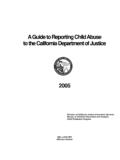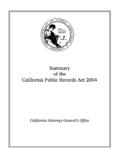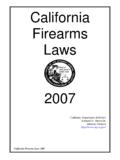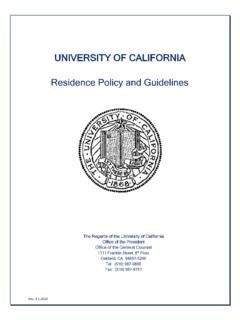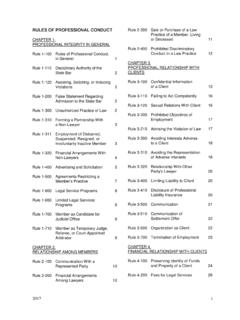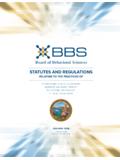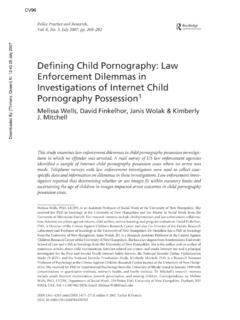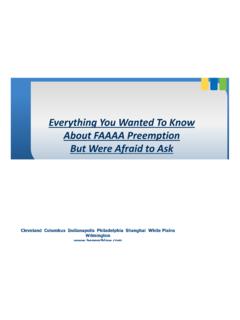Transcription of CHAPTER I. PURPOSE AND SCOPE - State of California
1 CHAPTER I. PURPOSE AND SCOPE The Ralph M. Brown Act (Gov. Code, 549501 et seq., hereinafter the Brown Act, or the Act ) governs meetings conducted by local legislative bodies, such as boards of supervisors, city councils and school boards. The Act represents the Legislature s determination of how the balance should be struck between public access to meetings of multi-member public bodies on the one hand and the need for confidential candor, debate, and information gathering on the other. As the rest of this pamphlet will indicate, the Legislature has established a presumption in favor of public access. As the courts have stated, the PURPOSE of the Brown Act is to facilitate public participation in local government decisions and to curb misuse of the democratic process by secret legislation by public bodies.
2 (Cohan v. City of Thousand Oaks (1994) 30 547, 555.) To these ends, the Brown Act imposes an open meeting requirement on local legislative bodies. ( 54953 (a); Boyle v. City of Redondo Beach (1999) 70 1109, 1116.) However, the Act also contains specific exceptions from the open meeting requirements where government has a demonstrated need for confidentiality. These exceptions have been construed narrowly; thus if a specific statutory exception authorizing a closed session cannot be found, the matter must be conducted in public regardless of its sensitivity. ( 54962; Rowen v. Santa Clara Unified School District (1981) 121 231, 234; 68 34, 41-42 (1985).) Where matters are not subject to a closed meeting exception, the Act has been interpreted to mean that all of the deliberative processes by legislative bodies, including discussion, debate and the acquisition of information, be open and available for public scrutiny.
3 (Sacramento Newspaper Guild v. Sacramento County Bd. of Suprs. (1968) 263 41; 42 61, 63 (1963); 32 240 (1958).) The Act only applies to multi-member bodies such as councils, boards, commissions and committees since, unlike individual decision makers, such bodies are created for the PURPOSE of reaching collaborative decisions through public discussion and debate. A host of provisions combine to provide public access to the meetings of legislative bodies. For example, the times and dates of all meetings must be noticed and an agenda must be prepared providing a brief general description of all matters to be discussed or considered at the meeting. ( 54954, ) As a precondition to attending the meeting, members of the public may not be asked to provide their names.
4 ( ) While in attendance, members of the public may make video or audio recordings of the meeting. ( ) As a general rule, information given to a majority of the members of the legislative body in connection with an open meeting must be equally available to members of the public. ( ) Before or during consideration of each agenda item, the public must be given an opportunity to comment on the item. ( (a).) 1 All statutory references are to the Government Code except as otherwise indicated. 1 While the Act creates broad public access rights to the meetings of legislative bodies, it also recognizes the legitimate needs of government to conduct some of its meetings outside of the public eye. Closed-session meetings are specifically defined and are limited in SCOPE .
5 They primarily involve personnel issues, pending litigation, labor negotiations and real property acquisitions. ( , , 54957, ) Each closed-session meeting must be preceded by a public agenda and by an oral announcement. ( , ) When final action is taken in closed session, the legislative body may be required to report on such action. ( ) The following chapters contain a more detailed discussion of the persons governed by the Act, the notice and agenda requirements, access rights of the public, limitations on closed sessions and available remedies for violation of the Act. CHAPTER II. BODIES SUBJECT TO THE BROWN ACT The Brown Act applies to the legislative bodies of all local agencies in California , , councils, boards, commissions and committees.
6 ( 54951, 54952.) In addition, any person elected to serve as a member of a legislative body who has not assumed the duties of office shall conform his or her conduct to the requirements of the Act, and shall be treated for purposes of enforcement of the Act as if he or she had already assumed office. ( ; see, 216 Sutter Bay Associates v. County of Sutter (1997) 58 860.) The Act does not apply to individual decision makers who are not elected or appointed members of legislative bodies such as agency or department heads when they meet with advisors, staff, colleagues or anyone else. Similarly, the Act does not apply to multi-member bodies which are created by an individual decision maker. (75 263, 269 (1992); 56 14, 17 (1973).)
7 However, where a body directs or authorizes a single individual to appoint a body, it would probably be subject to the Act. (Frazer v. Dixon Unified School District (1993) 18 781, 793; International Longshoremen s & Warehousemen s Union v. Los Angeles Expert Terminal, Inc. (1999) 69 287, 297.) Boards and commissions that are created by statute or ordinance are subject to the Act even if they are under the jurisdiction of an individual department head. A single individual acting on behalf of an agency is not a legislative body since the definition of that term connotes a group of individuals. Thus, a hearing officer, functioning by himself or herself in an employee disciplinary hearing, is not a legislative body (Wilson v.)
8 San Francisco Mun. Ry. (1973) 29 870, 878-879), nor is an individual city councilmember screening candidates for a vacant city office. ( , Indexed Letter, No. IL 76-181 (September 13, 1976).) 2 The Act applies to the meetings of legislative bodies of local agencies. An understanding of each of these terms is necessary in order to properly apply the provisions of the Act to individual situations. These terms will be discussed in the following sections. 1. Local Agencies Local agencies include all cities, counties, school districts, municipal corporations, special districts, and all other local public entities. ( 54951.) The first determination one must make in assessing the applicability of the Act is whether the agency is local in nature.
9 If the agency is essentially local in character, it is probably subject to the Act. ( 54951.) If, however, the agency is a multi-member State body, the Bagley-Keene Act applies. ( 11120 et seq.) The fact that an agency is created by State or federal law, rather than local ordinance, does not mean that the agency is not essentially local in character. ( 54952(a).) Factors in assessing the local versus State character of a body may include: the geographical coverage of the agency, the duties of the agency, provisions concerning membership and appointment, or the existence of an oversight agency. The issue of whether an agency is local or State in character was addressed in Torres v. Board of Commissioners (1979) 89 545, in the context of determining whether a housing authority was subject to the Act.
10 The court stated: While a housing authority may be a State agency for some purposes .. if it is within the Brown Act s definition of a local agency, it is simply not included within the State Act. We hold that a housing authority created by Health and Safety Code section 34200 et seq. is included within the statutory definition of a local agency under the Brown Act in that it is either an other local public agency or a municipal corporation or both, as those terms are used in Government Code section 54951.. The term municipal corporation is broader than the term city, particularly when the term city already appears in the applicable statute.. In order to give meaning to the term municipal corporation in Government Code section 54951 we hold that such term is not restricted to its technical sense of a city, general law or charter, but rather includes such entities as housing authorities.

